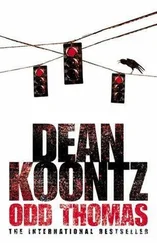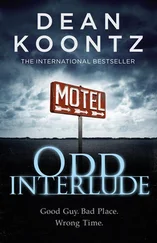The proper procedure probably was to repeat the call sign that the radioman aboard the cutter had given me, then identify myself by the call sign of the tug. Instead, I ignored the call.
For the sake of the nation, I was pleased to discover that Coast Guard officers were diligent and persistent. Apparently, by satellite tracking, they had monitored the rendezvous between the tugboat and Junie’s Moonbeam .
They were curious as to why we had delayed at the transfer coordinates after the yacht had departed. And they wanted to know why we were conveying the ill passenger south instead of immediately east to the harbor and the hospital.
After spending so much of their lives at sea, they recognized something fishy when they saw it.
Earlier, holding Joey at gunpoint, when I had hoped that help might be closer than fifty nautical miles, I had wanted to talk to the Coast Guard, but now circumstances had changed. I was not going to prattle about hijacked thermonuclear weapons over VHF/FM, on a frequency to which anyone might be listening, including Chief Hoss Shackett and his cloned midget, mini-Hoss, if such a one existed.
After increasingly testy messages insisting upon a response, they gave up. I assumed that now, with engines at full speed, the cutter had adopted a new course to intercept the tug, which was all right with me, as I would have debarked long before they arrived.
“Ode to Joy” struck up again as another call arrived on the regular phone.
I was a popular guy. Of course, having been a good fry cook for some years, I had grown accustomed to having a coterie of dedicated fans, usually with mustard stains on their shirts.
Riding with Birdie Hopkins as she had piloted her Cadillac in zero visibility had been unnerving. In spite of the radar and the GPS navigation, which all but guaranteed that the tugboat would not plow into anything, I found motoring fog-blind across the sea to be far more disturbing, second by second, than my entire time in the car with Fred’s widow.
Perhaps the watery abyss below had something to do with my nervousness. Or the aforementioned thermonuclear weapons.
Motoring almost directly across the shorebound waves instead of head-on against them, the boat did not pitch a great deal. But it did yaw more than I would have liked, even on this calm sea.
On the GPS sea map, along the shoreline, both natural and man-made landmarks were identified, including the Magic Beach pier, where all this had begun when I had gone for a walk to have a word with the mysterious young woman who had appeared in my dream.
Five-tenths of a mile south of the pier, the mouth of Hecate’s Canyon, a narrow defile, opened to the sea.
Because a running stream had carved the canyon over millennia, one of two conditions was likely to exist where sea and canyon met, the first involving sediment. If the terminus of the stream remained above sea level, the water would feather out as it exited the canyon, depositing silt the way that the Mississippi formed the delta as it approached the Gulf of Mexico.
If instead the canyon had been carved so deep that the western end of it was below sea level, the silt deposited by the stream had long ago been washed into the Pacific and carried away to far places. In that case, because tides also carve the land they meet, the ocean might have pressed into the canyon mouth, forming a cove with a deep-water approach.
Considering the geological age of the California coast and the steepness with which this length of it descended to the ocean, I was counting on condition number two. As I leaned close to the sea-map monitor to read the sounding lines, I noticed that this task had been made easier by a color key on a data bar at the bottom of the screen.
Land was depicted in gold. White signified deep water, which lay under my current position. Blue identified shallow water, and green warned of land exposed at low tide but submerged at high.
An eastward-narrowing but still sufficiently wide channel, surely deep enough to take the draft of the tugboat, bisected the beach. It carried forward into a cove that was recessed in the mouth of the canyon.
Bingo.
Due west of Hecate’s Canyon, I changed course for the coast.
No longer content to report on what now lay ahead, the radar seemed to express extreme dissatisfaction with the prospects of a lengthy journey on this course. I switched it off.
By the time I had motored less than half a mile east, the communications officer aboard the distant Coast Guard cutter came back to me by VHF/FM. He was full of questions again.
I felt that action would answer him better than mere words-and would be more certain to keep the cutter coming at the highest speed.
Through the bridge windows, I could see not a single coastal light, only palisades of fog that parted to reveal more of the same, though soon I would encounter something more solid than mist.
I throttled both engines forward and held the wheel steady. The sea map showed the tugboat driving precisely down the center of the Hecate’s Canyon channel, though still a mile offshore.
Not six weeks ago, at St. Bartholomew’s Abbey in the High Sierra, I had seen the first snow of my life, and within days, I had endured enough of the stuff to last a lifetime.
Magic Beach had been my first experience of a coastal town. At first it had seemed balmy and a welcome change from the blizzard that had buried the abbey.
Perhaps I would feel differently in time, but at that moment, as I approached the coast aboard the tug, through fog on treacherous seas, I felt homesick for the dry Mojave and Pico Mundo, and sick to death of water in all its forms, except as it might be necessary for bathing and flushing the john.
On Channel 22, the communications officer aboard the cutter, observing me by satellite, had stopped repeating the same questions and had begun to issue warnings in an urgent voice.
I was tense enough without having to listen to his shrill predictions of disaster. I switched off the radiotelephone.
The depth-finder began to pong more frequently.
“Ode to Joy” played again. Based on my experience with Utgard Rolf, something by Wagner or anything by any gangster-rap group would have been a better fit with his personality.
What had Beethoven ever done to Utgard that such lovely music should be used as a crime-phone ring?
On the screen: the white of a deep-water channel narrowing and funneling toward a narrow crescent of blue ahead, and beyond the blue a crescent of green, and beyond the green a great stately gold swath of land as solid as anyone could want it, the magnificent western ramparts of America the beautiful.
Motoring right down the center of the channel.
No need to check the fuel gauge. Only a few ounces were required to complete the trip.
The voltmeter. To hell with the voltmeter. I had no idea what a voltmeter did. Probably no more than one in a million people knew what a voltmeter did. Yet there it was, occupying a prime lower-left corner of the gauge board, so proud of itself, mocking everyone who was not a lifelong seaman with high voltmeter awareness.
Gear-oil pressure gauge, engine-oil pressure gauge, water temperature gauge, tachometers: They were of no interest to me now, suppliers of useless data, silly instruments of no import.
What respect I still had for marine technology was reserved for the depth-finder, the sonar soundings, ponging faster and louder, faster.
My plan, as patchwork as it might be, had been predicated on the belief that nuclear bombs were pretty much as hard to detonate as were sticks of dynamite.
You can throw a fat stick of dynamite against a wall, whack it with a hammer, stab it with a knife-and, at least as I understand the subject, it will not explode. A lit fuse will do the trick, as perhaps will a jolt of electric current from a plunger box, but if you want to drive across twenty thousand sticks of dynamite in a Peterbilt, you can do so, if I have my facts straight, without risk of being blown to bits.
Читать дальше
Конец ознакомительного отрывка
Купить книгу








![Dean Koontz - You Are Destined To Be Together Forever [an Odd Thomas short story]](/books/705298/dean-koontz-you-are-destined-to-be-together-foreve-thumb.webp)



